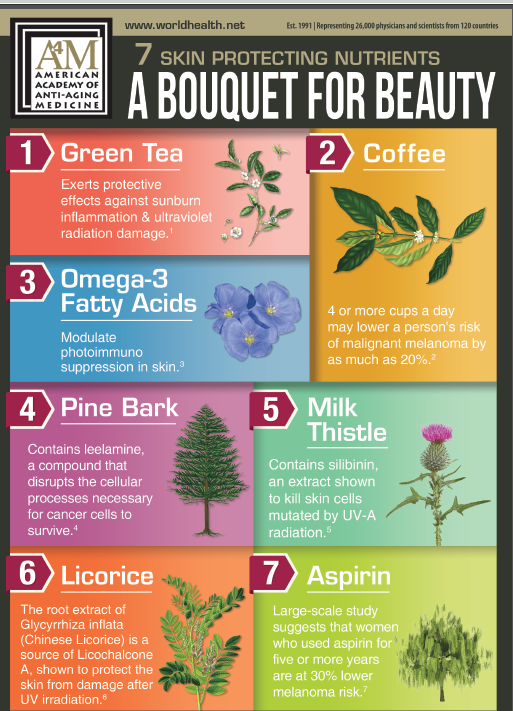SUN AND SKIN
Supplements and skin creams

The skin is the largest organ of the body and performs essential functions: it is the first line of defense of the body, which protects the internal organs and fluids.
Is therefore essential to care for.
Skin cancer (melanoma) is the most common form of cancer in the United States. The overall incidence of skin cancer increases by almost eight times over a period of 39 years, men and women of middle age. Jerry Brewer, dellaa Mayo Clinic (Minnesota, USA), and colleagues completed a population-based study using data from the Rochester Epidemiology Project: participants aged 40 to 60 years, with an initial diagnosis of melanoma between 1 January 1970 and 31 December 2009. The researchers found that among white, adult, non-Hispanics, the incidence of skin cancer has increased 4.5 times among men and 24 times for women. In particular, women under 50 years have shown a marked increase in melanoma. Although the chances of survival to melanoma increased by 7% for each year of study. In addition, the researchers found the strongest increase in the spread of melanoma occurred in the last ten years of the study, from 2000 to 2009. The researchers speculate that this may be linked to the disclosure of tanning beds in 1980 and 1990. The authors the study concluded that: "The incidence of cutaneous melanoma among middle-aged adults has increased over the past four decades, especially in middle-aged women, while mortality has decreased."
Among women, frequent sunburns during childhood can greatly increase the risk of future skin cancers. Abrar A. Qureshi, of Brown University (Rhode Island, USA), and colleagues analyzed data on 108,916 women, aged 25-42 years at baseline, enrolled in the Nurses' Health Study. Following the subject for 20 years, the team observed that those who had reported at least five sunburn when they had 15-20 years, had a higher risk of 68% of getting basal cell carcinoma and squamous cell carcinoma of the skin, and a 80% in more than risk of melanoma. Those who were exposed to the highest cumulative amount of ultraviolet radiation in adulthood had no increased risk of melanoma, but they had to be 2.35 times to 2.53 times more risk of developing basal cell carcinoma and squamous cell carcinoma of the skin. The study's authors argue that: "We found that exposure to the sun is in the first years of life is in adulthood can promote the appearance of basal cell carcinoma and squamous cell carcinoma, and melanoma risk is primarily associated with ' sun exposure early in life. "
Is therefore imperative to use sunscreen to prevent skin cancer. The fact that sunscreen helps prevent skin cancer has been the subject of debate and analysis among scholars. Elke Hacker, from Queensland University of Technology (Australia) and colleagues have elucidated the molecular mechanism by which it acts the sunscreen. The team confirmed that sunscreen protects against all three forms of skin cancer: BCC (basal cell carcinoma); SCC (squamous cell carcinoma); and malignant melanoma. In addition, the researchers observed that the sunscreen is effective to shield the p53 gene, a gene that works to prevent cancer.
In addition, daily use of a broad-spectrum sunscreen slows, and may even prevent, wrinkles, sun spots, skin fragility, characteristics of aging skin. Maria Celia B. Hughes, from the University of Queensland (Australia), and colleagues asked 903 men and women Australians, aged between 25 and 55 years, to use a broad spectrum sunscreen daily, and / or to hire a dietary supplement of beta-carotene (30 mg) per day. The subjects were followed for a period of four years, with dermatologic assessments to analyze the changes in skin appearance. The researchers found that the group who used sunscreen daily showed 24% fewer signs of aging skin, compared to those who used sunscreen occasionally.
See 7 active friends of the skin
The green
Coffee
Omega 3
Pycnogenol
Milk Thistle
Liquorice
Aspirin
Source: Worldhealth
Supplements and skin creams
